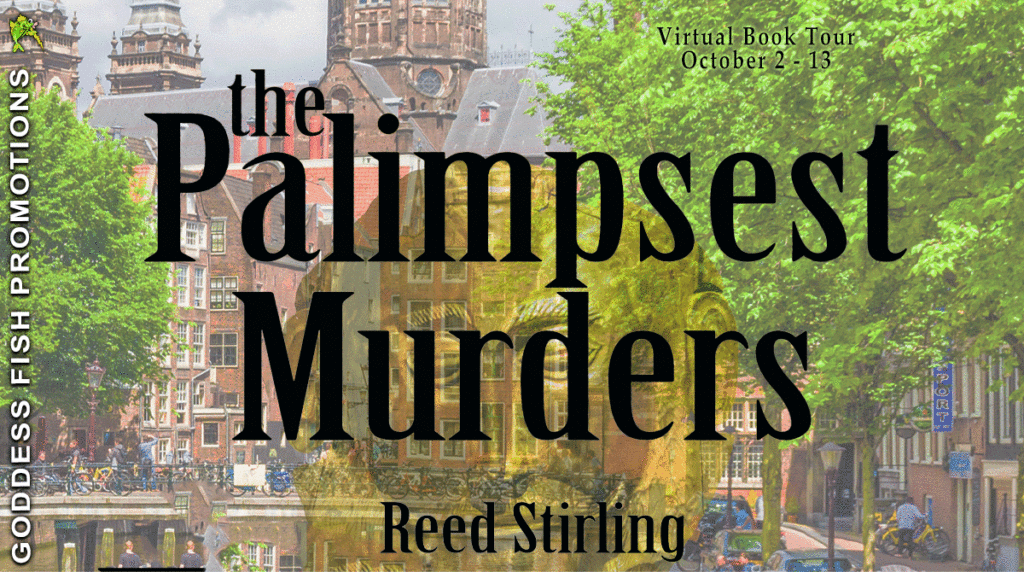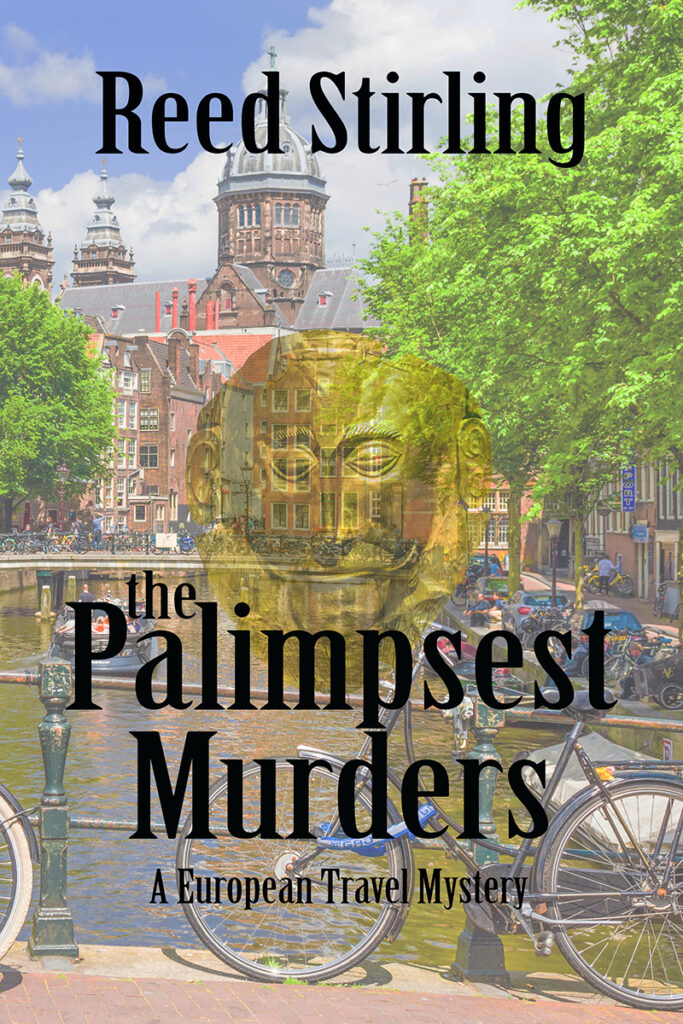Guest post and excerpt by Reed Stirling – author of THE PALIMPSEST MURDERS plus a giveaway

In developing the plot of The Palimpsest Murders, a significant challenge for me as a writer was conceiving of and developing in realistic terms the many characters who participate in the boat and bike excursion. I called this the palimpsest challenge. Who among them would be murdered and who among them would be the murderer? Conflict and individual motivation for dire action would determine how all that would play out against a background that Homer described in The Iliad and succeeding dramatists brought to ancient theatres like that in Epidaurus.
A focus character in my story is Alexsis Troyes. She is clever, articulate, and determined. Her role has to be ambivalent. As part of the palimpsest ploy, where the contemporary is a re-enactment of the past, Alexsis mirrors Sophocles’ Electra, princess in the kingdom of heroic Agamemnon.
Isla Troyes, Alexsis’ sister, is more temperate in her response to family strife. She has her counterpart in various ancient dramatizations.
Kat Steele, formerly Kat Troyes, is a stand-in for Clytemnestra, who murdered her husband Agamemnon in an act of vile reprisal. This treachery troubled both Electra and her banished brother, Orestes. Together, brother and sister wrought revenge on their mother, Clytemnestra, and her lover Aegisthus (Conrad Steele in the novel). The banished Forrest Troyes parallels Orestes.
Significantly, the name of the Dutch boat my characters travel on is The Iphigenia. Iphigenia in classical lore was sacrificed by Agamemnon so that the Greek fleet could sail to Troy and reclaim Helen. Long lost sister Jenny Troyes suffers a similar fate. Candice Troyes embodies the beauty claimed for Helen. Boyd Alexander has his counterpart in the ancient sagas.
Excerpt:
Isla and Candace, indeed. They proved to be most agreeable and, surprisingly, open. They must have heard from Alexsis that I was a sympathetic listener. At times, however, I felt as though a mini competition had occurred between them to see who could hold my attention the longest. Male vanity be damned! I enjoyed an unearned ego boost even if I might have erred in determining their motivation. Penny would have been amused at the sight of it — two appealing young women chatting it up with a balding, avuncular middle-aged man. David would have been taken aback if not absolutely bemused, beguiled even in the way that fathers can sometimes negate long-established filial estimations of the old man’s capabilities and even spark a little resentment. The opposite could also be proven true: sons surprising demanding fathers, sometimes in ways unimaginable. Boyd Alexander vis à vis Conrad Steele.
Candace first, or Candy, as she insisted I call her, but I could not bring myself to do so. Candy sounded belittling somehow, as in the expression eye candy. It struck me as undignified whereas Ace might have worked as a fit alternative to Candace. At any rate, Candace Troyes was beautiful in the classic sense of the word, not cute or pretty or merely a lovely specimen of womanhood. I’d discussed the notion of beauty early in my career in editing with a co-worker several days running as we pieced together the soundtrack for a film that starred an exciting new actor on the scene who had begun her career in public as a cover girl. He said she was gorgeous. I asked him why he thought so, and that started what turned out to be more a debate than a simple exchange of opinions. We contested concepts such as voluptuousness, grace, glamour, allure, style, sensuality, charm; we got into symmetry, harmony, proportion, and the like, and in the process exhausted our understanding of aesthetic appreciation. We balked at the idea of including intellect as a prerequisite for being thought of as beautiful. We touched on cultural expectations and then on brain functions, zeroing in on what is beheld in the eye of the beholder. The only conclusion we reached in our male chauvinistic appraisal was that said budding young starlet was sexy.
When I provided Penny with the details of our discussion on the essence of beauty, she said with satisfaction, “You’ve been engaging in scopophilia, the pair of you.”
Candace was as beautiful as her mother, Eleni, and just as shapely. Her long blond hair was tied today in a ponytail that hung down through the back adjustment of the black, crested ball cap common to all of the Conrad Corps when out on the cycling paths. She had full sensuous lips and a retroussé nose (displaying a tiny heart-shaped stud). Her complexion was olive-toned. Candace had startling green eyes that an aesthetically charged Botticelli might have fashioned; in fact, she struck me as one who could easily have glided off the center of a Botticelli canvass except for the fact she’d just been peddling along through a Lowlands grove and was presently involving me in conversation, conversation that went beyond the weather conditions and favourite colours. Previously she had struck me as quiet, demure, perhaps even sultry. On the contrary, she was absolutely engaging. And her beauty was spell binding.

The Palimpsest Murders
by Reed Stirling
GENRE: Historical mystery
BLURB: Day one: check-in on the Iphigenia, a Boat & Bike home for thirty guests of diverse backgrounds on a one week excursion through Holland and Belgium. Personalities clash, conflicts arise.
Day seven: a body is found in canal waters at the stern of the boat. On the final morning a second body is discovered.
Who among the cyclists and crew is hateful and motivated enough to kill? Twice. How are the two murders related? Why two coins for the ferryman? Is the phoenix jug, both admired and derided, merely symbolic? How does the death mask of Agamemnon lead to resolution?
Determining truth entails travelling from Amsterdam to Bruges to Paris to the ancient site of Mycenae in Greece where what’s past is shown to be prologue.
Excerpt
She was definitely formidable, imperious even, possessed of an elegant yet hardened beauty. Vanessa’s earlier estimation of Kat as a well-preserved, middle-aged vixen came to mind as I watched and listened to her, but any imagined resemblance to Sophia Loren was fading quickly. She was striking in her grandiose posing, seeming as though she’d slid down the reverse side of an ancient Greek vase intent on focusing our interest on her and her misery, the one-time exemplar of easy command and sensuous self-indulgence. I was considering the possibility that Kat Steele was living up to the character she had invented for herself in view of the performance the role of forlorn wife and rejected mother presently required of her. We’d all noted the air of theatricality about her. As to what I actually observed of her face that night in the lounge as she entertained us with her anxious but less than sober self-absorption and resentment, I could not avoid considering her likely dependence on Botox and all the meretricious beauty resulting from its application. Kat had brown eyes that appeared to be anything but lustrous on this occasion because of the smeared mascara shadowing them. Patches of darker pigment crested her high cheeks. The woman could boast having perfect teeth, the better to bite you with, and an aquiline nose sloped perfectly for looking down its length at you. I was intrigued particularly with how she worked her lips and how she slid words into statements with iambic stops and starts designed to smite verbal opposition.
AUTHOR Bio and Links:
Reed Stirling lives in Cowichan Bay, BC, and writes when not painting landscapes, travelling, or taking coffee at The Drumroaster, a local café where physics and metaphysics clash daily. Before retiring and taking up writing novels, he taught English Literature. Several talented students of his have gone on to become successful award-winning writers.
He and his wife built a log home in the hills of southern Vancouver Island, and survived totally off the grid for twenty-five years during which time the rooms in that house filled up with books, thousands of student essays were graded, and innumerable cords of firewood were split.
Literary output:
Shades Of Persephone, published in 2019, is a literary mystery set in Greece.
Lighting The Lamp, a fictional memoir, was published in March 2020.
Set in Montreal, Séjour Saint-Louis (2021), dramatizes family conflicts.
The Palimpsest Murders, a European travel mystery, is forthcoming.
Shorter work has appeared over the years in a variety of publications including Dis(s)ent, Danforth Review, Fickle Muses, Fieldstone Review, and Humanist Perspectives.
Intrigue is of primary interest, with romantic entanglement an integral part of the action. Greek mythology plays a significant role in underpinning plots. Allusions to art, literature, philosophy, and religion serve a similar function. Reed sits down to write every day and tries to leave the desk having achieved at least a workable page. Frequently what comes of his effort amounts to no more than a serviceable paragraph, a single sentence, or a metaphor that might work in a context yet to be imagined.
Links:
reedstirlingwrites.com
reedstirling@gmail.com
https://www.smashwords.com/profile/view/bookswelove
https://authorcentral.amazon.comgp/home
https.//ca.linkedin.com>reed-stirling
Affiliated Authors @ LinkedIn
Reed stirling @ Instagram
a Rafflecopter giveaway
I like the cover! It sets the stage for the book!
You’re quite right, Jeanna, abut the cover. The imagery suggests boats and bikes, which is important in terms of characters and plot. The mask of Agamemnon underpins the theme that what is past is prologue. Thanks for your interest.
You’re quite right, Jeanna. Setting is established and the mask of Agamemnon is suggestive of the theme that what is past is prologue. Thanks for your interest.
You’re quite right, Jeanna, about the cover. It provides setting and hints at theme. Thanks for your interest.
We appreciate you hosting today!
My pleasure!
Thanks to Aubrey Wynne for this blog opportunity. Reed Stirling.
Happy to share. Good luck on your release!
New-to-me author. Thank you for sharing.
Many thanks.
I look forward to reading this.
Thank you Julie, I’m encouraged by your comment. The Palimpsest Murders will certainly entertain the observant reader.
Sounds like a good book.
I like the blurb. Sounds great.
Thanks for hosting me on your blog site. Greatly appreciated.
Seems like a good mystery.
Maeilyn
A mystery, yes, one that involves the reader in a wide range of suspects. In the last analysis, the reader is the final arbiter as to who is the victim and who is the perpetrator of a crime.
Loving the cover
The cover provides setting as well as hints at events from long ago having an influence on present action. Thanks for your comment, Terri.
I just always wonder if the winters were really cold in southern Vancouver? You need to write about living off the grid.
The winters on southern Vancouver Island are not particularly cold, but we do get snow. Depending on the amount, the snow can be all gone within a week.
Living off the grid was an adventure in pioneering. Loved it. Miss splitting fire wood. Write about it? Possibly. when my next piece of fiction is completed.
Thanks for your interest, Audrey.